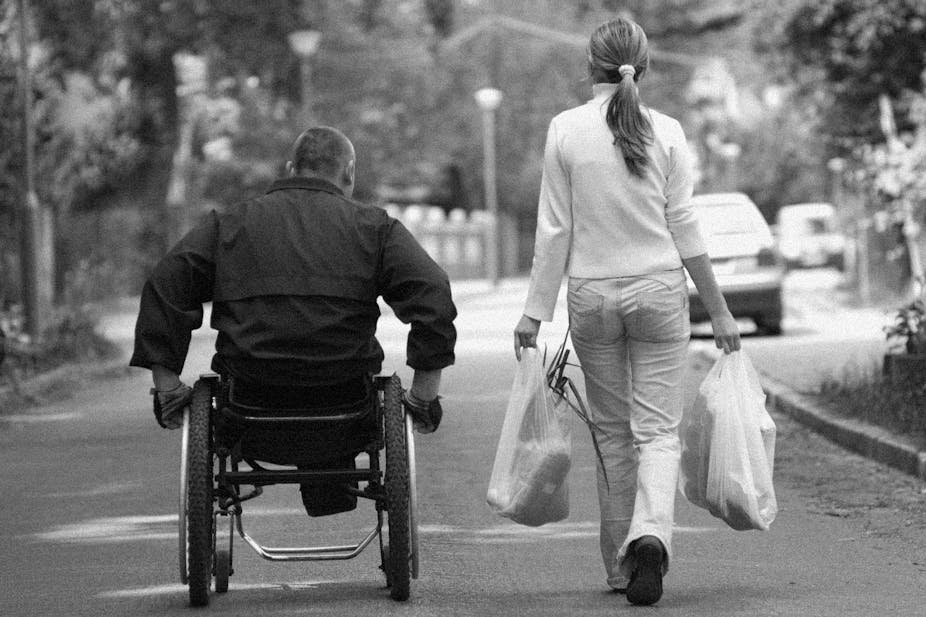Before others can be attracted to you, you first need to believe in yourself. So that means, for example, answering with a “Yes!” the question of whether you have what it takes to attract another. This is a crucial question that one must ask; it is a crucial issue in human development.
And we are disgusted, I guess, by the not uncommon practice of a person acting in calculating ways, deviously trying to increase their appeal towards their potential love interests – this is just selfish and contrary to love. Yet many selfish strategies place a higher value on cosmetic enhanced beauty than on the substantial character of the person.
Think about this. If this ethic is deemed valid, which I suspect it is, it means that it is just not plausible to have a disabled love interest. Is this widespread in our society?
To live life as a person with severe disabilities means developing extraordinarily strong self-esteem and the self-assurance of your value. This is necessary to live life according to those values you, as a disabled person, find most admirable in yourself.
So, the challenge is to be defiant of what anyone else may think; you are here now. You can only be the best you can, which indeed is remarkable enough!
Superficial notions of attraction
Many of the reasons that disability is not attractive from what I would call a “love interest” sense are baseless stereotypes. These are actually formed according to an antiquated medical model of what it means to be human.
It is possible, I believe, to eliminate the stereotypical fears of inadequacy that are not only held by people with severe physical disabilities, but just as importantly by those who “care” for them. The trick is to encourage the dispirited disabled person to go and seek out stories that inspire.
There are many who excel in different areas of life who acknowledge the beneficial enhancement of their lives by those with such different complexes of abilities and their subsequent development of abilities to influence and attract, which is nothing less than awesome.
I had conducted some research on what I prefer to call “inter-ability relationships” between those depicted as being “extremely disabled”. The results were interesting, and heartwarming, to say the least.
One of my most recent research endeavours was to tour the website of both Megan (able-bodied) and Barton (severe cerebral palsy), focusing on their marriage and love life. They also shared a passion to communicate with the written word. Their ability to love and laugh together was founded on the mutual passion for writing. Barton and Megan Cutter went on to publish a book, Ink in the Wheels: Stories to make love roll.
They are unique characters that drive this story of love, sex and relationship. Love never rolled by itself and their lives experienced the ups and downs that are present in most relationships. But they pulled together through this to tell their story of how they faced the challenges of being an “inter-ability married couple”.
Ink in the Wheels provides a phenomenally powerful love story that allows people to understand some of the conquests that are made by sheer determination.
Don’t deny our capacity to love
In an attempt to drive home my feelings on this, I will reveal something about myself that I have previously made public. I was diagnosed with Friedreich’s Ataxia at 14 and in these 39 years, with this severely progressive disability, I have been no stranger to inter-ability relationships. But finding the right person to be able to handle me and my disability has been difficult.
That has been hard enough; how I am also to deal with the demeaning and deplorable stereotypes held by many in our society? Such attitudes, I believe, continue to make it difficult for me to create, develop and sustain the kind of a relationship I would want to develop.
I do not have a complete philosophical account of why I enjoy the chance or fulfilment of making love. Well I guess it’s because I am a human.
Maybe, for starters, this is one form of human pleasure I am still capable of performing. I mean that in a holistic sense. While my abilities of performance may be dwindling, and on a level of consciousness that is distressing, my ability to love has increased.
And for the life of me I don’t see why I also have to combat the utterly ridiculous stereotypes of some. Despite the dumb thinking and incoherent logical responses of others in relation to this matter, I certainly don’t have a cognitive disability. This means that I would respect myself for my knowledge.
But, like many stereotypes, this perception is to some degree an inescapable societal reality. But it’s not a fact, only the fulfilment of social misguidance.
Is life changing? Is there more acceptance of a difference in “love” these days as it is publicly discussed?
The answer is yes, but it has still got a long way to go. This is not to forget that there is also a need for ongoing redemption from past mistakes.
Thank you to Bruce Wearne, Steffan Irugalbandara and Cunxia Li for their assistance in preparing this article.

